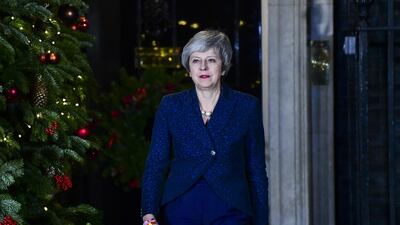December is pantomime season in Britain. In theatres across the country, children watch adaptations of fairy tales, in which actors perform slapstick comedy and tell old jokes to the audience. A standard feature of the genre is when the villain skulks onto the stage, unnoticed by the main character. The crowd shouts, “Behind you!”, and the hero gets a fright, but always survives.
Pantomime season has also opened in the House of Commons, where a number of MPs have been loudly warning Prime Minister Theresa May that hard-line Eurosceptics within the Conservative party were plotting to stab her in the back. This internal campaign to unseat Mrs May culminated last night in a confidence vote among her own MPs.
The conspirators failed. Mrs May won the vote by 200 to 117. This means that she has the trust of almost two-thirds of her parliamentary party, but none from a third of them. She has survived as prime minister and no further challenge is possible for a year. But the backstabbing is not over, and now the Brexit pantomime is entering its final and decisive act.
Later today, Mrs May will speak with her Irish counterpart and other leaders of the European Union, in the hope of miraculously renegotiating some part of the complex deal she agreed with the EU last month. EU leaders are adamant that renegotiation is not an option, although they may offer some kind of pleasantly worded additional document to help the wounded Mrs May stagger on to her self-imposed deadline of March 29, 2019.
However, Brexit may not happen at all now. There is no deal that commands majority parliamentary support. Some MPs want a hard or no-deal Brexit, some accept Mrs May’s version, others fantasise about a deal similar to those of Norway or Canada, while many simply want to remain in the EU.
Mrs May, like Conservative leaders before her, is trying to appease the hard-line leave faction − the ones who have just tried and failed to overthrow her − by winning concessions from the EU. That mission, however, now looks impossible.
The simple truth is that appeasing her right-wing Conservative critics − who have come together since 1993 as the euphemistically named European Research Group – has not worked and never will.
That’s because Brexit has never been about what is best for the people of Britain. It has always been a violent ideological feud within the Conservative party itself. Lasting for generations, in political terms, it is like a narcissistic Mafia vendetta. As the Conservative Attorney General Geoffrey Cox put it, the vote to unseat Theresa May was another “self-indulgent spasm”. Meanwhile, Scotland’s First Minister Nicola Sturgeon, of the Scottish National Party, summed it up perfectly. “The UK is facing chaos and crisis entirely because of a vicious civil war within the Tory party,” she said. “What a self-centred bunch they are.”
The Conservative party always saw itself as the "party of business", of competence and of "the Union" that binds together the interests and identities of England, Wales, Scotland and Northern Ireland. Now, its self-seeking infighting has jeopardised each of these claims. This government has dismayed business leaders, emboldened the independence movement in Scotland, and given plenty of encouragement to those in Northern Ireland who wish to secede from the UK and become part of a unified Ireland.
This whole sorry story began back in the 1990s, when the Conservative prime minister John Major faced similar attacks to those that have been carried out on Mrs May. They came from Eurosceptic colleagues with powerful friends in right-wing think tanks and newspapers, especially the Daily Mail and those owned by Rupert Murdoch, who helped to spread anti-EU ideas for many years.
When David Cameron became prime minister in 2010, he pandered to demands that he pull his party out of the most important conservative grouping in the European parliament, the EPP – much to the dismay of Angela Merkel and other centre-right leaders. Cameron appeased the Europhobes once again by promising the 2016 referendum on EU membership.
When Mr Cameron lost the referendum, he handed the poisoned chalice of leadership to Mrs May, who tried to balance negotiating a Brexit deal with the EU and mollifying the right-wingers who had undermined both her Conservative predecessors.
Yet again, those attempts at compromise have not worked. Mrs May is now a prime minister viewed as profoundly weak at home and pitied abroad. She may achieve minor EU concessions, but the 117 Conservative MPs who opposed her leadership are unlikely to be impressed with any of them.
Labour, the Liberal Democrats, the Greens and Scottish National Party remain implacably hostile, and Northern Ireland’s Democratic Unionist Party is not especially helpful to her cause. It is difficult – almost impossible – to see how any Brexit deal negotiated by Mrs May can succeed in parliament.
That leaves only two options: no deal, or no Brexit. The no-deal scenario is one of economic and political suicide and, as such, unacceptable to most MPs. So, now, when the crowd calls out “behind you”, Mrs May is likely to find a second referendum looking over her. A People’s Vote seems to be the only final act that could make any sense in Britain’s Brexit pantomime.
Gavin Esler is a journalist, television presenter and author


